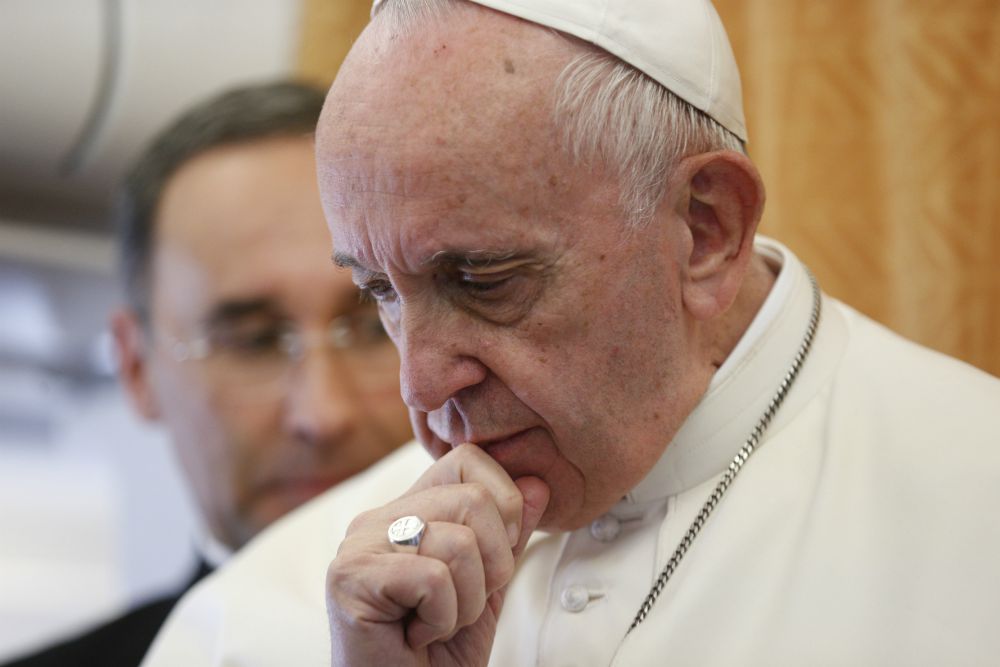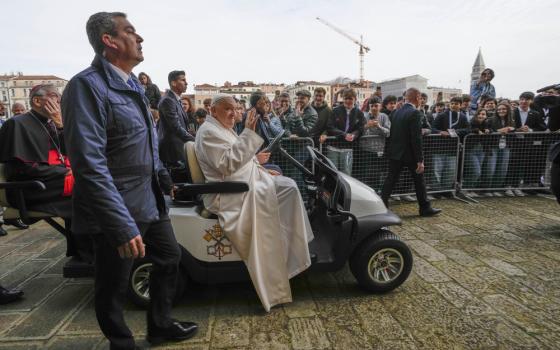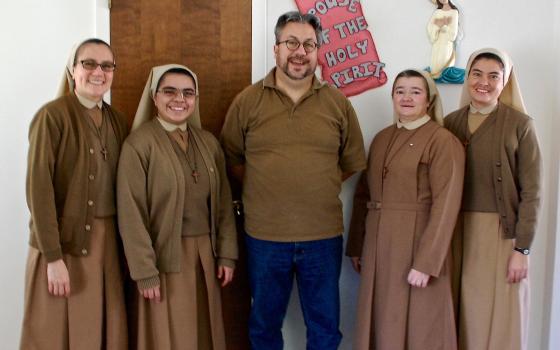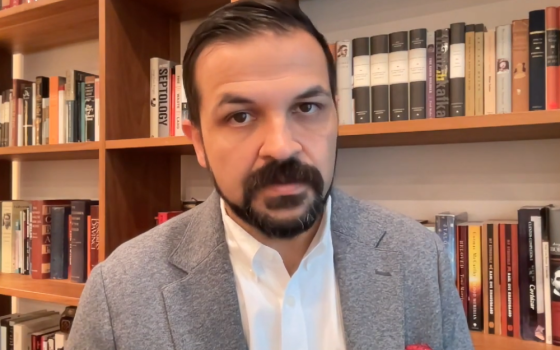
Pope Francis pauses as he answers questions from journalists aboard his flight from Skopje, North Macedonia, to Rome May 7. (CNS/Paul Haring)
In June 2016, just after Pope Francis announced he would create a commission for the study of the history of women deacons in the Catholic Church, he joked to journalists, "When you want something not to be resolved, make a commission." Apparently, he wasn't kidding after all.
On May 7, while aboard the papal flight from Macedonia to Rome, Francis announced that, after three years of study, the papal commission was unable to find consensus and give a "definitive response" on the role of women deacons in the first centuries of Christianity.
He claimed that what remained unclear was whether women deacons received a sacramental ordination.
"It is fundamental that there is not certainty that it was an ordination with the same formula and the same finality of men's ordination," he said.
Anyone who has ever listened to Francis speak about women knows why this would be such a crucial distinction for him. Like popes before him, Francis believes strongly that women are not entitled to sacramental power or authority and that it is God's intended purpose that men and women have different roles in the church.
In follow up comments to the Union of Superiors General (UISG) — the women religious whose dialogue with the pope prompted him to call the study commission on the women's diaconate —in Rome on May 10, the pope said that the individual members of the commission will pursue studies on their own but remained ambiguous about whether he would call to commission back together.
"I am not afraid of studies," Francis said aboard the plane. That may be true, but what is also becoming clearer and clearer is that the pope is afraid of women in his church having even the modicum of sacramental participation that the diaconate would give them.
Why else would he question what decades of scholarship has made abundantly clear? There is ample historical evidence that women did serve as deacons. It's even in the canon of the Bible: Paul mentions the deacon Phoebe in the letter to the Romans.
Splitting historical hairs is not what Francis' papacy is known for. Back in 2015, the pope told the bishops at the synod on the Family "that the Church should not be a stuffy 'museum of memories,' but have the courage to change if that was what God wanted."
Advertisement
During World Youth Day in 2013 he acknowledged that many people see the Church as a "relic of the past," and a “prisoner of its own rigid formulas."
But rather than showing the courage and openness to which he constantly calls everyone else in the church, Francis blames his commission for having different interpretations of history, making desperately-needed progress on the status of women wholly dependent on an elusive ancient precedent.
The pope even appears to blame God for not revealing to us whether women could have a sacramental ordination: "We need to look back to the beginning of revelation, if there wasn't such a thing, if the Lord did not want a sacramental ministry for women, it doesn't go."
And then the pope who so often preaches openness and inclusion warns that, if we don't like it, we are welcome to leave the church.
"We cannot go beyond revelation and dogmatic expressions," Francis told the UISG. "We are Catholics. If someone wants to make another church, they are free to do so."
That line is particularly glaring when you read it in the context of the countries Francis has traveled to and the people he has encountered and demonstrated openness to in the past few months.
This is a man who has visited eight Muslim-majority countries meeting with countless imams, including a February trip to the United Arab Emirates where he signed, with the grand imam of Egypt's al-Azhar Mosque, a first-of-its-kind declaration calling for Muslims and Christians to build together "a society that is open, fraternal and respectful of differences."
In April he literally kissed the feet of leaders from South Sudan in an attempt to plead with them to remain in peace.
And this most recent trip to Bulgaria and North Macedonia was one of many attempts to reach out to leaders in the Eastern Orthodox churches in his ongoing quest to achieve full communion between the Catholic and Orthodox churches.
Francis' boundless energy and dedication to peace and justice stands in stark contrast to the dithering way he is handling question of women deacons in his own church. His passionate cause for unity among churches and with people of other faiths, it seems, stops short of the women of his own church who are asking simply for more inclusive ways to serve.
This latest episode is yet another example of the Catholic Church's perpetuating and justifying notions of gender inequality that are the root of women's suffering globally. And that is a tragedy because Francis' power over the consciences of world leaders could have incalculable influence on raising up women to equal status, including in the countries he visits, many of which still have overtly restrictive, patriarchal cultures.
But, sadly, patriarchs still seem to dominate Francis' religious imagination. It is interesting to note that in the same press conference aboard the plane where Francis made his comments on women deacons, the pope also reflected on the richness of his meeting with Bulgarian Orthodox Patriarch Neophyte, according to NCR's Joshua McElwee:
"In the patriarchs, I have found brothers," mentioning Constantinople's Bartholomew and Moscow's Kirill by name. "I do not want to exaggerate, but I want to say the word 'holy' — men of God."
"We are brothers," said Francis. "We cannot adore the Holy Trinity without having the united hands of brothers."
But what about the 850 sisters who stood before him in Rome asking for most basic steps of restoring women to some semblance of equality with men?
Francis, it seems, would much sooner invite these Orthodox "holy men" into deeper sacramental union and participation in the Catholic Church than he would the women religious in his own church — many of whom have labored in "the field hospital" for more than 50 years.
Last year, the final document of the Synod on Youth called the inclusion of women in the church's decision-making structures a "duty of justice" that requires a "courageous cultural conversion."
But rather than treat the issue of women deacons with the same urgency that he treats so many matters of justice, Francis has communicated — like so many popes before him — that women’s legacy of leadership requires further questioning, and their participation in ministry alongside men could be a dangerous step and, therefore, must be indefinitely stalled.
In the six years of his papacy, Francis has been celebrated for his constant calls for courage, encounter, dialogue and risk-taking. How long must we wait until he offers the same to the women of his own church?
[Jamie L. Manson is an award-winning columnist at the National Catholic Reporter. Follow her on Twitter @jamielmanson.]
Editor's note: We can send you an email alert every time Jamie Manson's column, "Grace on the Margins," is posted to NCRonline.org. Sign up here.







